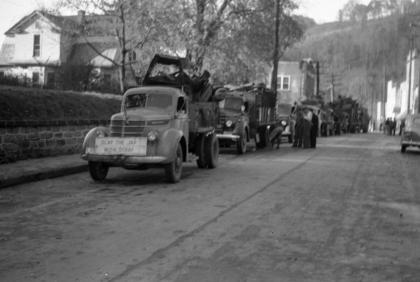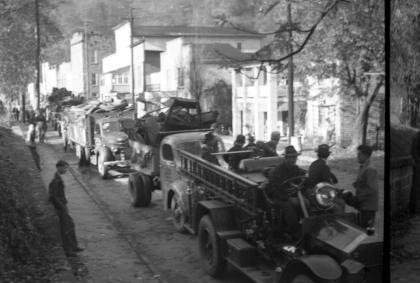SUNNY CAL JOURNAL - Milkweed Pods, Scrap and Sacrifice, Calhouners Step Up To Plate On Bended Knee


Calhouners learned the lessons of sacrifice (shown here
a metal scrap parade in Grantsville)from the Great Depression
and the World War II effort (David Hathaway Photos)
By Bob Weaver
Taking me by the hand, my mother and Aunt Eleanor roved the hills around the McCoy farm at Hur, pulling milkweed pods to be used as fiber in life-jackets for soldiers in faraway lands, fighting World War II.
Aunt Eleanor had married uncle George Washington McCoy shortly after he went off to war. She went to the Hur Church three times a week to ask the congregation to pray for her husband's safe return.
Climbing up and down the steep paths, they put the pods in brown A & P grocery bags and took them to Grantsville.
In Grantsville, they organized metal scrap collections for the war effort, having scrap parades and piling up the scrap in enormous mounds to impress the citizens about its importance.
On the radio, President Franklin D. Roosevelt asked citizens to sacrifice for the war cause. Calhoun men were drafted or volunteered in droves, about 1,300 Calhouners marching off to defend America against Nazi Germany and Japan's empire building.
I was told our milkweed efforts might save the lives of soldiers, my mother incanting the names of uncles Delbert, Ernest, Lauren, Carlton, Gus, Lowell, and William, along with a hundreds other men from our community.
At the youthful age of four, I began to understand sacrifice, learning the virtue of rationing gasoline and food, collecting junk, growing large "victory gardens," and trying to understand why our adult women were leaving their homes to work in factories.
Rationing was a system which was said to allow the rich and the poor to have the same amount of scarce goods.
They quit making Coca-Cola and sodas during the war because of the lack of sugar. Coffee was also scarce.
Going to the Grantsville A & P with our ration stamps, we carefully used thought-out lists, making each purchase count, still bartering with eggs from our chicken house.
One thing we couldn't get was butter, a butter-like substitute was all that was available. It was white and didn't look like butter, so they packed a capsule of yellow dye to mix with it, making it more acceptable on the dinner table. Usually, a family member was assigned to put the yellow in the "butter," a process of mixing and kneading.
I began to understand that some of our family members and neighbors would not come back from this terrible war and we should do our part on the home front.
My dad said, "If we survived the Depression, we can surely survive this."
In Grantsville, local citizens donated to Charter Shaffer's "Defense Duck" fund with most every community having Civil Defense workers who watched the skies with binoculars and organized community efforts.
Harry Holiday was in charge of air raid black-outs in Grantsville, ringing the siren and causing the lights to be turned off until the all-clear was sounded.
At Hur, my family would huddle under dim gas lights around the old radio hooked to a car battery and listen to Edward R. Murrow and H. V. Kaltenborn give their reports from the war front.
After the broadcasts, we would drop to bended knee on the front porch of the McCoy house and pray for our loved ones.
Right after the war, my first grade teacher Thelma Stump placed cardboard boxes with red crosses on the window sills of her classroom at the Grantsville Grade School.
She sent notes home asking families to donate soap, toothpaste and other items for the boxes, to be mailed to a solider "overseas."
When America was struck on 9-11, President George Bush asked Americans to "sacrifice" by shopping more, board airplanes without fear and just continue their routine, including driving their big-engined cars which used lots of gasoline.
That sacrifice sunk deep into our national spirit.
Now, we've returned to more conspicuous consumption.